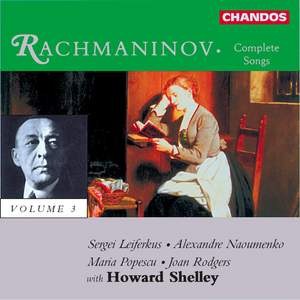Offer,Rachmaninov: Songs, Vol. 3
Joan Rodgers (soprano), Maria Popescu (contralto), Alexandre Naoumenko (tenor), Sergei Leiferkus (baritone), Howard Shelley (piano)
This set opens with a powerful dramatic outpouring, Letter to KS Stanislavsky. In fact it's a formal letter of apology, for unavoidable absence from a gathering, which Rachmaninov sent for Chaliapin... — More…
Contents
Rachmaninoff: Letter to K.S. Stanislavsky
- Sergey Leiferkus (bass), Howard Shelley (piano)
Rachmaninoff: Songs (14), Op. 34
- Alexandre Naoumenko (tenor), Annamaria Popescu (mezzo-soprano), Sergey Leiferkus (bass), Joan Rodgers (soprano), Howard Shelley (piano)
14 Songs, Op. 34: No. 1. Muza (The Muse)
14 Songs, Op. 34: No. 2. V dushe u kazhdogo iz nas (In the Soul of Each of Us)
14 Songs, Op. 34: No. 3. Burya (The Storm)
Rachmaninoff: Iz evangeliya ot Ioanna (From the Gospel of St. John)
- Sergey Leiferkus (bass), Howard Shelley (piano)
Rachmaninoff: Songs (6), Op. 38
- Joan Rodgers (soprano), Howard Shelley (piano)
6 Songs, Op. 38: No. 1. Noch'yu v sadu u menya (In my Garden at Night)
6 Songs, Op. 38: No. 2. K ney (To Her)
6 Songs, Op. 38: No. 3. Margaritki (Daisies)
6 Songs, Op. 38: No. 4. Krisolov (The Rat-Catcher)
6 Songs, Op. 38: No. 5. Son (A Dream)
6 Songs, Op. 38: No. 6. A-u!
Excerpt,
- Joan Rodgers (soprano), Howard Shelley (piano)
6 Songs, Op. 8: No. 6. Molitva (A Prayer)
Rachmaninoff: Vsyo khochet pet (All wish to sing)
- Joan Rodgers (soprano), Howard Shelley (piano)





